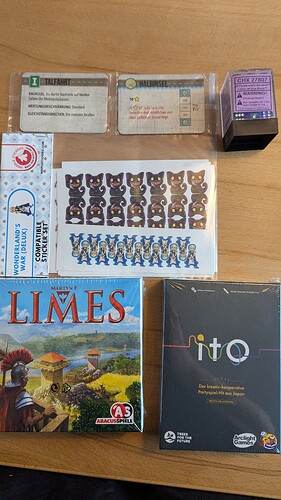What probably no one asked for. My understanding, which I’m sure is some non-zero percent correct.
Yeah, two schools of thought seem to have emerged in the post-WWII era, labeled “euro” and “ameritrash.” Causation, who knows, but they do seem to align with the likely feedback from that global encounter.
German games could be summarized by “elegance” and “symbiosis.” Some key tenets of the “Eurogame:”
- Separation of theme and mechanics - which doesn’t have to mean pasted on. They can be very sympatico with each other. But mechanics are never dictated by theme. See Settlers - who makes a road out of wood and bricks? No one I know. The balance of resources dictate the cost, not the theme. (shouldn’t we be making our roads out of stone and our cities out of bricks here? Anyone?)
- Non destructive interaction - Blocking, ok. Taking something first, ok. Bumping, ok if the bumpee is compensated. Destroying? Never. Here’s El Grande, win by having more, not by removing you.
- Elegant rules - minimal but meaningful
- Symmetry - everyone has an equal chance. I think this is just German, nothing to do with a war.
- Positive scoring - everyone makes something and gets a score. The winner did best.
American games could be summarized by “theme/story” and “discovery/exploration.” Maybe “fighting” too. Some key tenets of “Ameritrash:” (note that there’s nothing inherently wrong with Ameritrash, just we never agreed on a better term)
- Theme based mechanics - Rules are bent and drafted to fit the theme, with as many exceptions and edge cases as needed. Balance can suffer.
- Destructive or zero sum interaction - more fight than race or parallel competition
- Explosion of rules and components - the emphasis on theme, story, and discovery led to the “more is more” mindset. Bigger boxes, different units, cards cards cards, etc.
- Asymmetry - yeah, all these things are related. But with little focus on balance or elegance, this becomes an option. See Cosmic Encounter, Dune, Axis & Allies, etc.
- Reductive scoring - I win by removing you or somehow destroying your game assets. Risk. Magic. Star Realms. Fortress America.
So I’m getting to what may be an interesting point?
1995-2005 saw these ideas begin to cross the Atlantic and we entered the golden age of the hybrid. There’s a lot of great concepts on both sides, and it more comes down to quality of implementation than strength of philosophy. But look at Spirit Island - a set of Euro ideals in the symbiosis and elegance (consistency of rules across scenarios and deities) alongside Ameritrash ideals of asymmetry and an endless deck of god powers. Good stuff.
I think with the dominance of the hybrid, “pure euro” has been pushed to the fringe as a caricature of what it once was. Kind of like all our political parties have been pushed to the extremes of what used to be broader and more palatable ideals?
The possibly interesting part: With that, I think the definition of “Euro” has moved from a set of design ideals into a set of tropes or mechanics. Weak actions that are upgraded during the game. Score tracks that score AxB points. Upgradable player boards. Dissociated minigames. 3-6 scoring archetypes which invite multiple sessions to explore them all. Even now, though, they have “randomized scoring objectives” that is a very Ameritrash concept.
Euro doesn’t have to be these things. But it is, just because it clearly separates it from the hybrid crowd and because it is currently proven to sell.
What is being done with Euros mean?
So if anyone is done with that, absolutely. These tropes weren’t great to begin with and we’ve all seen them enough times now. But I personally still think of “euro” as the design philosophy I listed at the beginning. And it’s still La Granja, New Frontiers, Terra Mystica family, Agricola… even Cyclades is pretty darn Euro by the bullets up top. So if you are kind of done with something people call Euros, but also still titillated by elegant, mechanics forward, positive scoring games, fill your boots, I guess?


